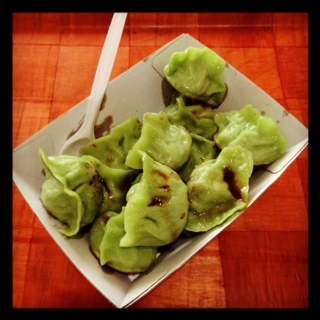"Vushka" are a special food for a special day - whether it's celebrated on December 25th or, like most Ukrainians, on January 7th, which is it's date on the old or "Julian" calendar. Special because:
- "vushka" are only eaten once a year at the "12 courses for 12 apostles" Holy Night supper that starts with the first star in the sky;
- "vushka" are often made from the finest dried mushrooms - which at more than $300 per kilo could become the stuff of smuggling and packages Duct-taped to airplane passengers;
- "vushka" are small and fiddly and need great care and love in the making, and;
- "vushka" are shared with the people we are closest to.
Like my Shanghai-based sister. She recently sent me a reference claiming ear-named dumplings may have come from ancient China where a charitable emperor fed them to the poor to ease a disease of their ears. If they heal ears I know not, but can attest to them helping me use my own.
At my childhood Christmases on the Shawangunk ridge of upstate New York, with cousins, sisters, mothers, fathers, aunts, uncles, neighbours, and uncles who weren't really uncles but had nowhere else to share the meal, the specialness of "vushka" was respected and recognised through their rationing. To remind ourselves that goodness can be fragile and is to be cherished, each bowl carefully got an allocation of three. You ate them slowly and well - or at least that was the idea.
If you somehow got one more than the quota, it was almost as good as the presents delivered by the "angels" to the bottom of the "yalynka" (Christmas tree) after the ringing of the bells (or just clinking of cognac glasses if the grown-ups couldn't be bothered).
This year, my Australian wife said to me: "Hey, are we going to have those little ear-thing dumplings?"
And, it made me listen. Listen to the love she gives me and those around her. Listen to her desire to make this Christmas special and better for our families. Listen to her implicit desire for renewal and connection.
I was fortunate enough to keeping listening, to really try to tune into my heart and my surrounds, down at the modern and gym-like Cathedral at Parramatta - filled with Filipinos, Chinese, Italians, "Aussie Aussies" and countless others in what's considered the world's most culturally diverse archdiocese.
As we waited for Christmas Mass, I first heard us fidgeting with newsletters and watched us checking out each other's outfits and waistlines. I looked at faces and made out that I saw worry about the success or failure of family lunches to follow, or whether the Council's gift of free parking was really legit.
I thought about how we (okay me) get so caught up in the "business of busy" that seems to be modern life. When did a late train become so important? Why is a family member's or work colleague's off-the-cuff remark a dagger? How does the small stuff become my daily "fiscal cliff"?
As the Go-Betweens song goes: "always the traffic, always the lights". Why is there always seemingly more noise and more clutter - or the "monkey mind" as the Buddhists call it?
But then I listened to the invited Tongan choir - flowing white robes against dark South Pacific faces - warm up by soaring through its "Gloria". And, I don't mean the Van Morrison or Laura Branigan songs.
The choir singers as big as defensive tackles in the NFL - and that's just the girls - but with pure voices that took things above and beyond my daily chores, bores and snores. Truly transcendent "Gloria in Excelcis Deo".
Calming yet vibrant like a lush garden right after rain. I make out it was improbably but tenderly cultivated and grown in some crappy, rented Scout hall on many Wednesday nights after a working day cleaning other people's waste at the hospital, or driving a school bus of screaming kids, or getting tossed around by a road-side jackhammer.
During the sermon, I listened to the Sri Lankan priest - now safe from a brutal war - ask us to pray for tiny tots in Connecticut and how we were going to make this Christmas different.
So, I prayed - which is always harder than I care to admit. Then, I went home and put some "vushka" on, photographed them with a phone that's apparently smarter than me, and wrote what I hope are these simple if too many words.
Because as those little "ears" float there in a soup of my making on a table in our house with my wife pottering, I am thankful to have heard the message of hope and light that is Christmas and share it with you.
Merry Christmas. Peace be with you.
(PS: Here's a link for "vushka" recipes from Olga Drozd: http://www.ukrainianclassickitchen.ca/index.php?topic=4920.msg7388#msg7388. Of Ukrainian heritage, Olga was born in Germany, raised in Australia and now lives in Canada, and I'm grateful for her really, really excellent website.)












